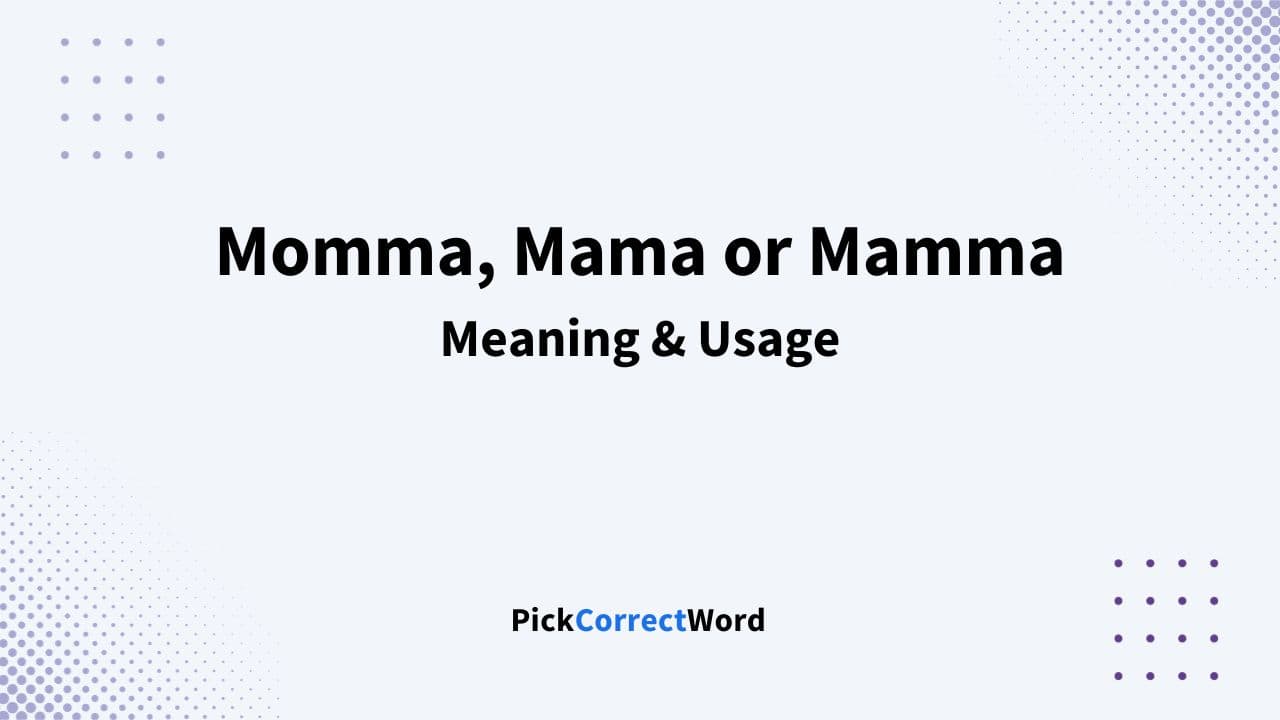When people say momma or mama or mamma, they refer to their mother. These words are like nicknames or softer ways of saying “mother” and have the same meaning.
All these words come from the natural sounds babies make and are used all over the world.
People often say momma, mama, or mamma, depending on where they are from or their family tradition. Each word is correct and shows love and respect for a mother.
Momma or Mama or Mamma? Which is correct?
You can call your mother “Mama,” “Momma,” or “Mamma.” All of them are correct spellings. A lot of the time, cultural and dialectal preferences determine which one to use.
The word mom itself is commonly used in American English, whereas mum finds more use in British English.
Variations such as mama, momma, and mamma have been adopted in various languages and dialects, reflecting the universal nature of this intimate form of calling one’s mother.
- Mama: This term is widely used across various languages, including English, Spanish, Russian, Mandarin, and even Navajo. It’s one of the first words babies often utter.
- Momma: More prevalent in American English, it is an informal term with the same sense of warmth and closeness as “mama.”
- Mamma: While less common in English, this spelling is more frequently used in Italian and some forms of British English.
Understanding the Usage, Spelling and Differences
Momma:
This is a colloquial term used in English, especially American English, to refer to one’s mother. It’s an informal and affectionate term, often used by children or when speaking to children.
Example: “Momma’s going to make your favorite dinner tonight.”
Mamma:
This is another term for mother that is used in various languages, including Italian, Swedish, Russian and Greek. In English-speaking countries, it’s also often used by children, or adults when speaking to children.
Example: “Mamma, can you read me a bedtime story?”
Mama:
This is perhaps the most universal term for mother, used in many languages around the world including English, Spanish, German, Dutch and others. Like “momma” and “mamma,” it’s often used by children or when speaking to children.
Example: “Mama, I scraped my knee.”
Differences in American and British English
In American and British English, the terms “momma,” “mama,” and “mamma” are used differently, reflecting subtle regional variances.
In American English, “momma” and “mama” are more informally used when referring to one’s mother. The term “momma,” particularly, is often seen in American English. It is derived from “mom,” a shortened version of “mother,” and carries an affectionate tone.
British English, on the other hand, frequently uses “mamma”, which conveys a similar level of informality and affection. The choice between these terms typically depends on personal preference and regional dialect.
What is the difference between “momma” and “mama”?
The words “momma” and “mama” both mean “mother,” so they are both used to show affection. The spelling “momma” is sometimes used instead of “mama,” but “mama” is the more common choice in English. It can depend on regional preferences, personal choice, or cultural contexts.
Can “mama” be considered grammatically correct?
Yes, calling your mom “mama” is correct grammar and a common way to show affection.
In writing, when should one prefer to use “momma” or “mama”?
One’s preference in writing can be subjective and based on the audience and context. “Momma” can be used in a more loving or playful way, while “mama” is more common and can be used with a broader audience.


